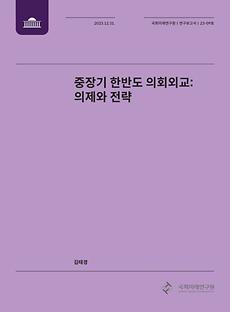
This study explores the agenda and implementation strategies of parliamentary diplomacy on the Korean Peninsula in terms of mid- to long-term future strategies on the Korean Peninsula. As part of the ongoing research project Mid- to Long-term International Strategy and Parliamentary Diplomacy, the study focuses on the issues of the Korean Peninsula. The purpose of parliamentary diplomacy on the Korean Peninsula is to establish the National Assembly's status on the issues of the Korean Peninsula which encompass mid- to long-term future horizons. The study outlines a mid- to long-term parliamentary diplomacy agenda based on future strategies pertaining to the Korean Peninsula, the perspective of which will contribute to a bipartisan, minimalist consensus for the National Assembly.
In 2022, the results of the National Assembly Future Research Institute's "Mid- to Long-term Future Strategy on the Korean Peninsula: Consociational Governance on the Korean Peninsula" highlighted the easing of political and military tensions and institutionalization of peace as a prerequisite for the establishment of peace on the Korean Peninsula and future integration. They additionally emphasize the importance of establishing governance that encompasses civil society. Considering the link between the preconditions of future strategy on the Korean Peninsula, policy routes, mid- to long-term strategies, and short-term priorities, the study sets two agenda items for parliamentary diplomacy on the Korean Peninsula: 1) arms control in support of mid- to long-term peacebuilding, 2) human rights agenda that is meaningful both as a goal of peacebuilding and as a methodology in conjunction with the peace process. The study reviews analysis of each agenda item’s issues, lessons drawn from cases of the peace process and transitional justice implementation, and the National Assembly's legislative efforts related to each item. The study proposes an integrated approach, or issue-linkage strategy, for arms control and human rights agenda to promote the parliamentary diplomacy agenda.
To effectively promote mid- to long-term parliamentary diplomacy on the Korean Peninsula and enhance the National Assembly's status on the Korean Peninsula agenda, establishing an environment for consociational dialogue and negotiations should first be emphasized for domestic and foreign networking. The arms control-human rights agenda linkage strategy is essential in terms of a methodology that creates a consociational environment and is also meaningful as a broad networking strategy that enables bipartisan dialogue.